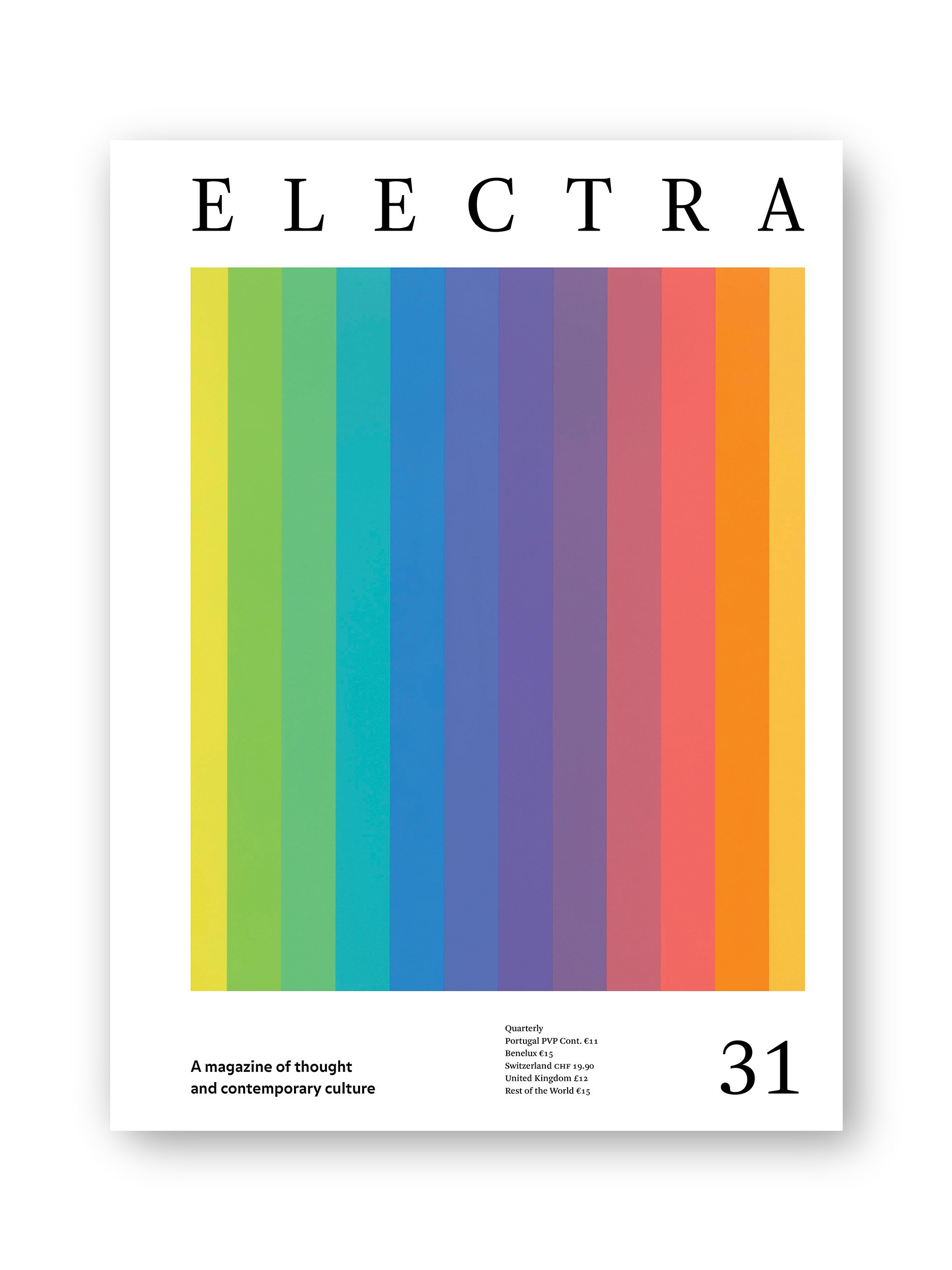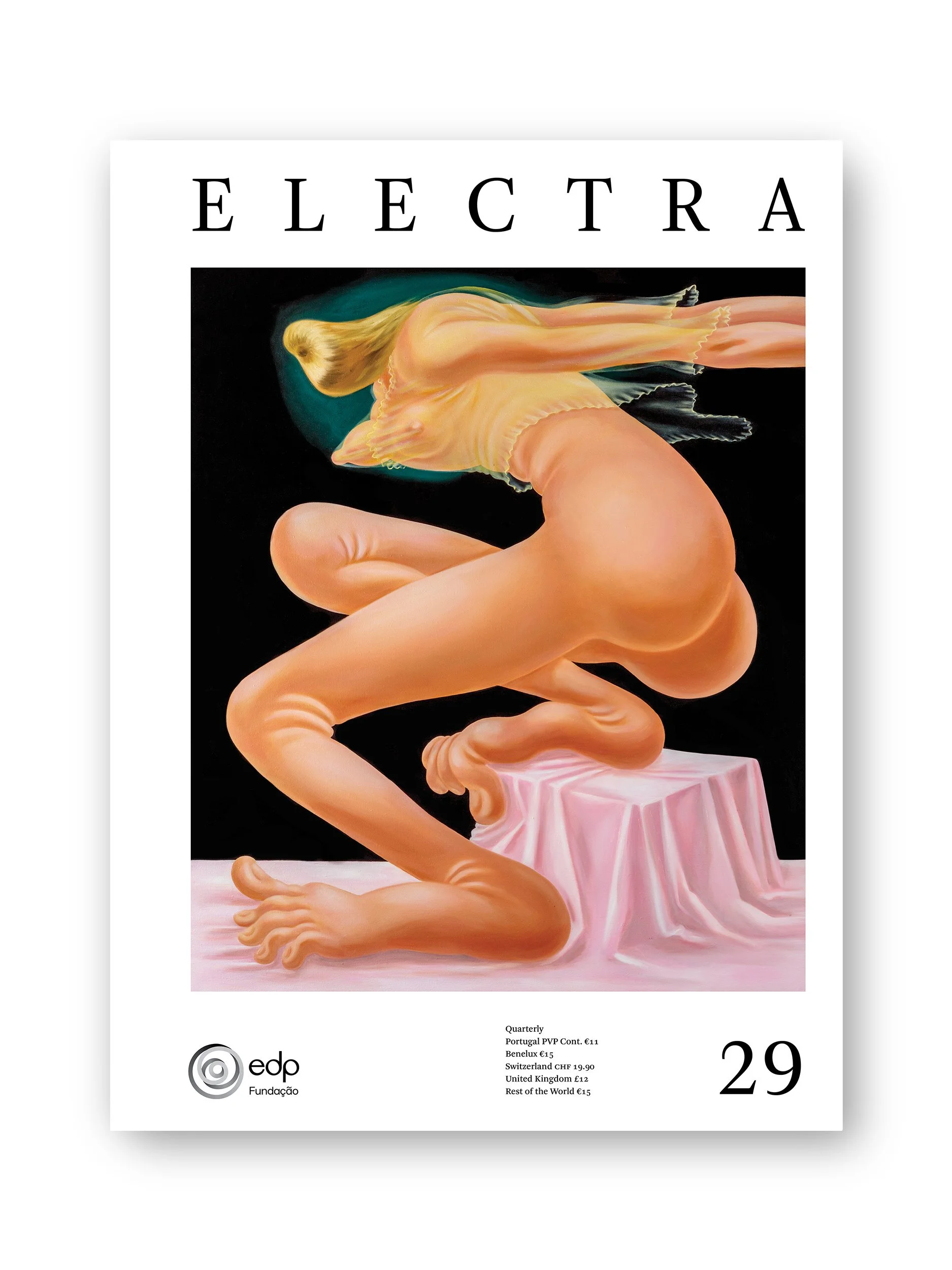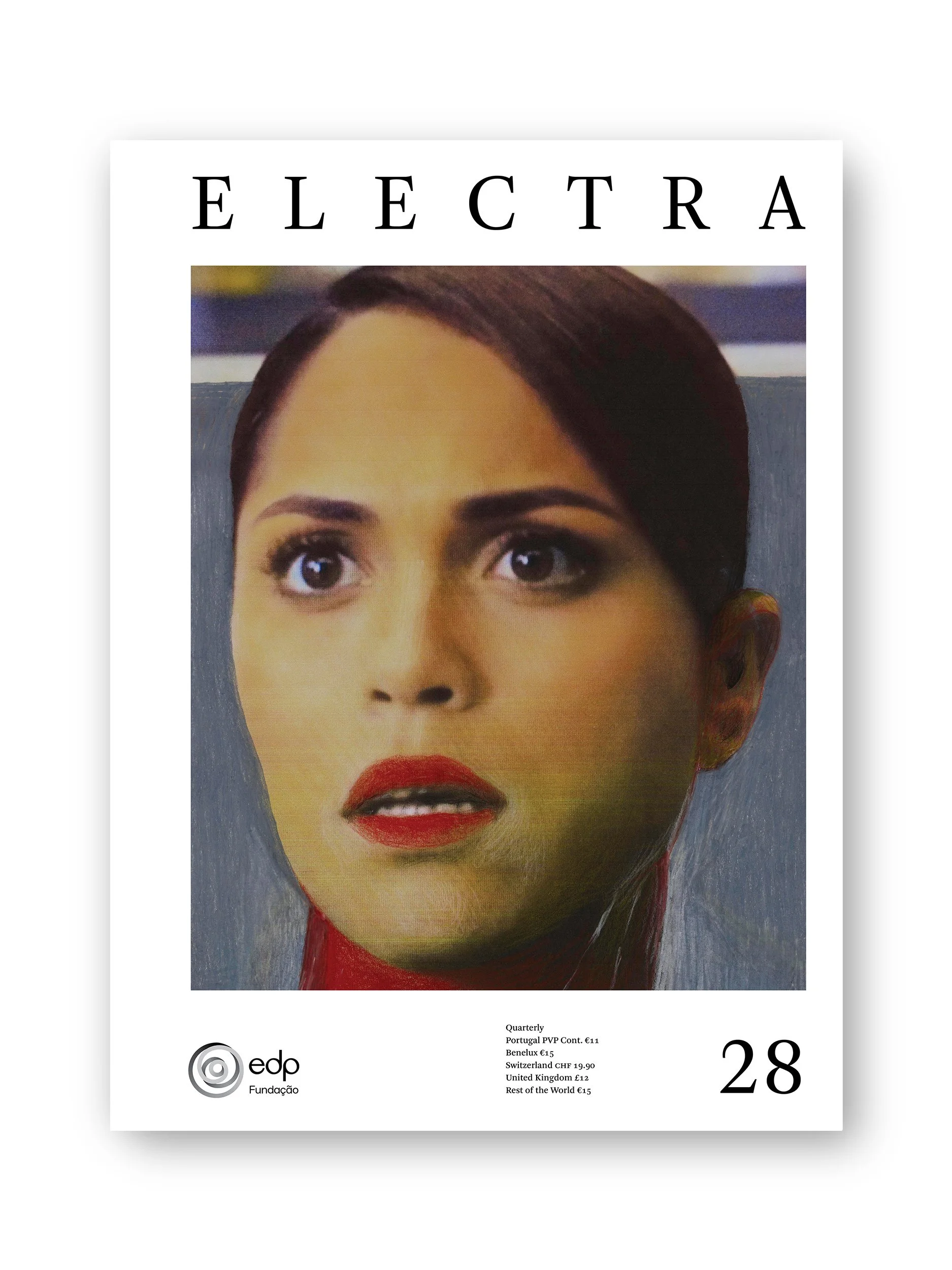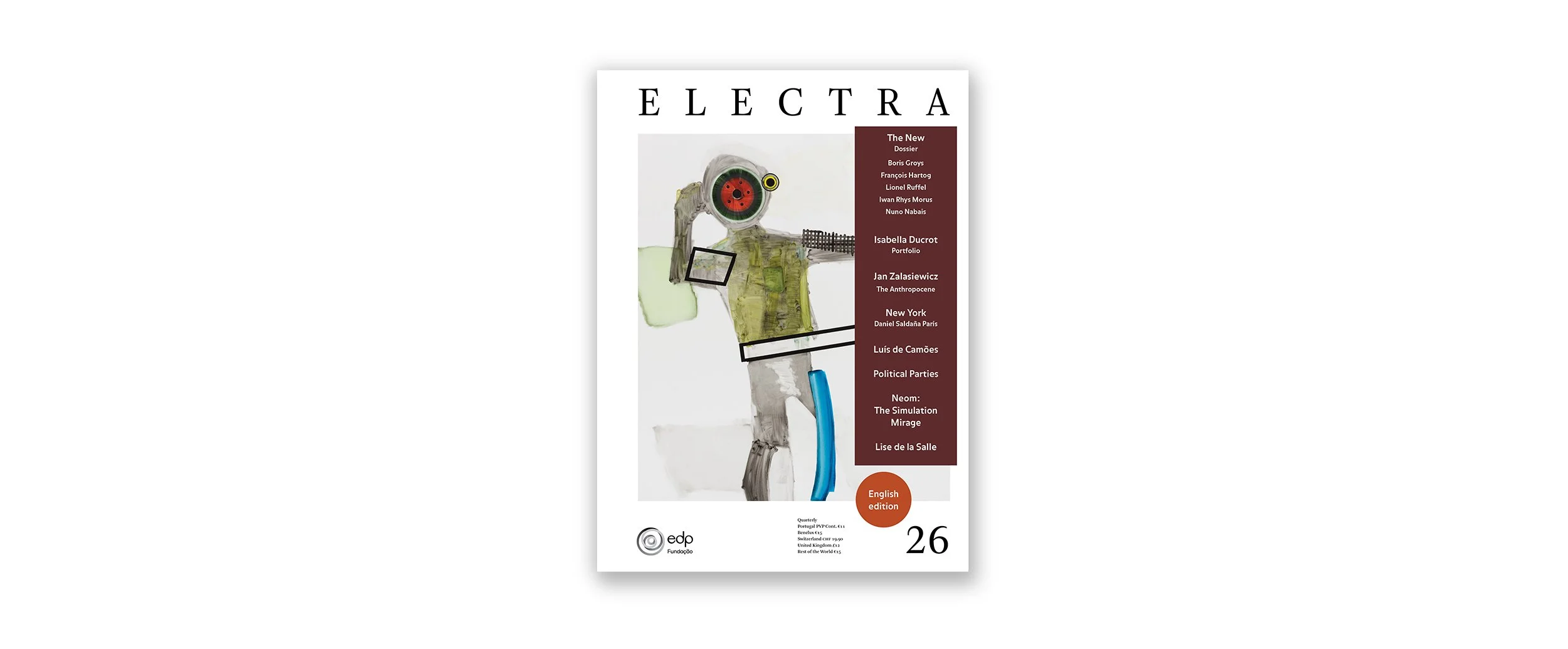....Electra 12 / Curiosity..Electra 12 / Curiosidade....
















....Electra 12 / Curiosity..Electra 12 / Curiosidade....
....
Curiosity is the theme of the dossier of the new issue of Electra magazine. A series of texts (authored by Olga Pombo, Neil Kenny, Pedro Russo, Federico Ferrari, Lionel Ruffel, António Guerreiro) bringing together issues relating to science, art, philosophy and religion outline the history of Curiosity, its variations and changes, seeking to understand it as an essential foundation of modernity.
A featured piece in issue 12 of Electra is the worldwide pre-publication of a chapter from the biography of Fernando Pessoa, written over the last few years by Richard Zenith, one of the greatest world experts on the poet, and whose English edition will be launched in the summer of this year, while the Portuguese edition will be published in the Autumn. This pre-publication of a chapter from Pessoa: A Biography serves as an announcement of a work that will henceforth become essential to scholars and readers of Pessoa.
This edition includes a rare interview with film director Pedro Costa: a journey through his work and everything it entails. Pedro Costa imbues what he does with the same personal and unique reflection that is presented in his internationally acclaimed work.
Electra 12 goes on talking about cinema by tracing the profile of the Portuguese film director Joaquim Pinto; Afonso Ramos writes about “speculation”; American historian Bradley W. Hart sketches a portrait of the 1920s, a dangerous and fascinating decade which “never saw a return to normality”; there are two texts published about Lisbon, one written by Nélio Conceição (images and representations of the city) and another by Nuno Fonseca (the soundscape); musician and author Adolfo Luxúria Canibal writes about Paris, mixing his own memory with that of others; João Constâncio comments on a quote by Henry de Montherlant, showing how it can be interpreted today in light of the “unreason” pervading present times; South-Korean pianist Yeol Eum Son writes about the world’s present and past, in a journal intersected by the pandemic; and this edition’s portfolio is authored by Austrian artist Heimo Zobernig, who will open his next exhibition at mumok, in Vienna.
.
Softcover, 27 x 20 cm, 230 pages
—
..
A Curiosidade é o assunto do dossier da nova edição da revista Electra. A partir de um conjunto de textos (da autoria de Olga Pombo, Neil Kenny, Pedro Russo, Federico Ferrari, Lionel Ruffel, António Guerreiro) que convocam questões do conhecimento, da ciência, da arte, da moral e da religião, traça-se a história da Curiosidade - as suas variações e mudanças ao longo das épocas – tentando compreendê-la como um fundamento essencial do nosso tempo.
Em destaque, no número 12 da Electra, está a apresentação, em pré-publicação mundial, de um capítulo da biografia de Fernando Pessoa, que um dos maiores especialistas mundiais no poeta, Richard Zenith, tem vindo a preparar e a escrever ao longo dos últimos anos, e cuja edição em inglês será lançada no Verão deste ano, saindo a edição em português no Outono. Esta pré-publicação de um capítulo de Pessoa: Uma Biografia, serve como anúncio de uma obra doravante fundamental para os estudiosos e leitores de Pessoa.
Nesta edição, publica-se uma rara entrevista ao realizador Pedro Costa e que se constitui como uma viagem pelo seu trabalho e por tudo o que o envolve. Pedro Costa dá ao que faz um pensamento tão pessoal e singular como a sua obra que hoje tem um amplo reconhecimento internacional.
Na Electra 12 continua-se a falar de cinema ao esboçar-se o perfil do realizador Joaquim Pinto; Afonso Ramos escreve sobre “especulação”; o historiador norte-americano Bradley W. Hart faz o retrato dos anos 20 do século XX, uma década perigosa e fascinante, em que “nunca houve um regresso à normalidade”; publicam-se dois textos sobre Lisboa, escritos por Nélio Conceição (imagens e representações da cidade) e por Nuno Fonseca (a paisagem sonora); sobre Paris escreve, misturando a sua memória e a de outros, o músico e escritor Adolfo Luxúria Canibal; João Constâncio comenta uma frase de Henry de Montherlant, mostrando como ela pode hoje ser interpretada à luz da «desrazão» que alastra no nosso tempo; a pianista sul-coreana Yeol Eum Son escreve, num diário atravessado pela pandemia, sobre o presente e o passado do mundo; e o portfolio desta edição é da autoria do artista austríaco Heimo Zobernig, que inaugurará a sua próxima exposição no mumok, em Viena.
.
Capa mole, 27 x 20 cm, 230 páginas
—
....
“....”Today’s Hollywood productions are in way comparable to those of the classic era of the first half of the 20th century. The cinema, which shaped me, had it all: fantasy and art, a moral, sure, but also a huge preoccupation, almost an obsession, with reality, at least with that of the North-American society. Film used to be an observer and companion. ..A produção de Hollywood, hoje em dia, não tem qualquer comparação com a produção da época clássica da primeira metade do século XX. Esse cinema, que me formou, tinha de tudo, fantasia e arte, uma moral, claro, mas também uma atenção enorme, quase uma obsessão, pela realidade, pelo menos pela realidade da sociedade norte-americana. O cinema era um observador e um companheiro. ....”
“....On January 27, 1932, after many months of being politely threatened with legal action, Pessoa finally settled with a law firm representing Lourenço & Santos, then the finest tailors in Lisbon. Though he often found himself practically penniless, relying on friends to pay his share of the lunch tab, the poet never scrimped on clothes or books. ..Em 27 de Janeiro de 1932, depois de muitos meses sob uma cortês ameaça de acção judicial, Pessoa acertou finalmente as contas com um escritório de advocacia que representava Lourenço & Santos, na época a mais elegante alfaiataria de Lisboa. Embora se achasse com frequência sem um tostão, fiando-se na generosidade dos amigos para pagar a conta do almoço, o poeta nunca economizou em roupa ou livros. ....”
“....The history of curiosity took a radical turn in the sixteenth and especially seventeenth century. Much – but not all – curiosity became ‘good’, or at least morally neutral. Having long been a vice, curiosity became in many discourses a passion, that is, a normative process in our cognitive engagement with the world. ..A história da curiosidade sofreu uma mudança radical nos séculos XVI e, sobretudo, XVII. A maior parte da curiosidade – embora não toda – tornou-se boa, ou pelo menos moralmente neutra. Considerada um vício durante séculos, reemergiu como uma paixão em muitos discursos, ou seja, como um processo normativo de envolvimento cognitivo com o mundo. ....”
“....One thing seems to be common to every kind of curiosity. Attention (or ‘care’, from the Latin etymon cura) to the singularity of things, and the ability to see what things are not, but could be. Not so much the ability to see, perhaps, as to notice, observe, speculate. Attention that makes it possible to recognise that which is strange, irregular, and falls outside established familiarities. And the desire to see things in a different way, open up discordant realms, and point out diverging paths. ..Uma coisa parece ser comum a todos os tipos de curiosidade. O cuidado (do étimo latino cura) com a singularidade do que é, e a capacidade de ver o que não é mas poderia ser. Menos talvez a capacidade de ver do que de notar, reparar, interrogar. A atenção que permite reconhecer o estranho, o irregular, o que escapa às familiaridades estabelecidas. E o ímpeto para ver de outro modo, para abrir campos discordantes, para apontar caminhos divergentes. ....”
-
....
Director / José Manuel dos SantosEditor / António Guerreiro
Portfolio / Heimo Zobernig
Published by Fundação EDP
Spring 2021.Softcover, 27 x 20 cm, 230 pages
ISBN 978 989 54964 57..
Director / José Manuel dos Santos
Editor / António Guerreiro
Portfólio / Heimo Zobernig
Publicado por Fundação EDP
Primavera 2021.Capa mole, 27 x 20 cm, 230 páginas
ISBN 978 989 54964 40....












One of the most consistent and yet fully surprising architects working today, Álvaro Siza, Pritzker Prize shares his List spanning from fundamental editions on Alvar Aalto or Walther Gropius, to lesser-known Italian modernism, Brazil, critical history and philosophy, a striking novel, and poetry, from Portuguese to Greek and Persian masters.